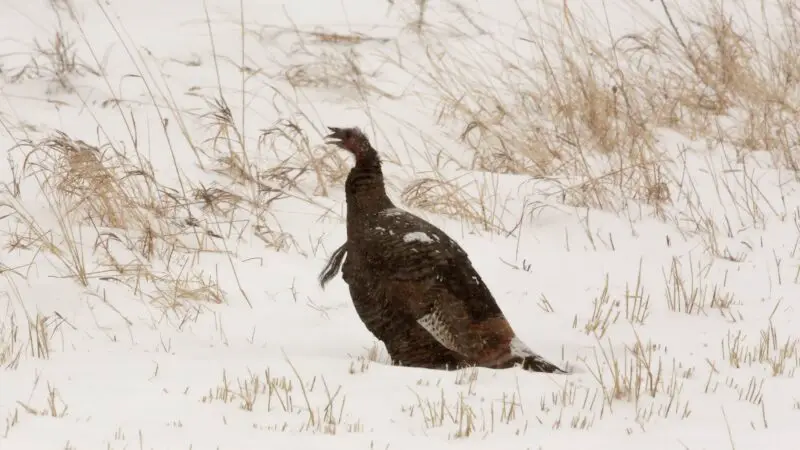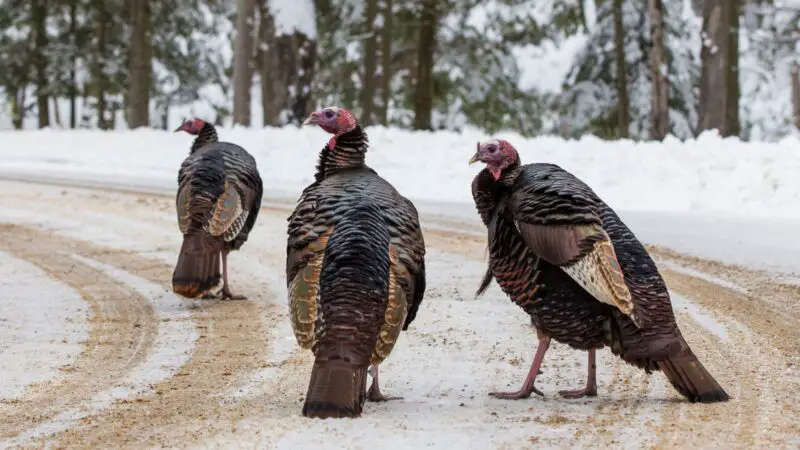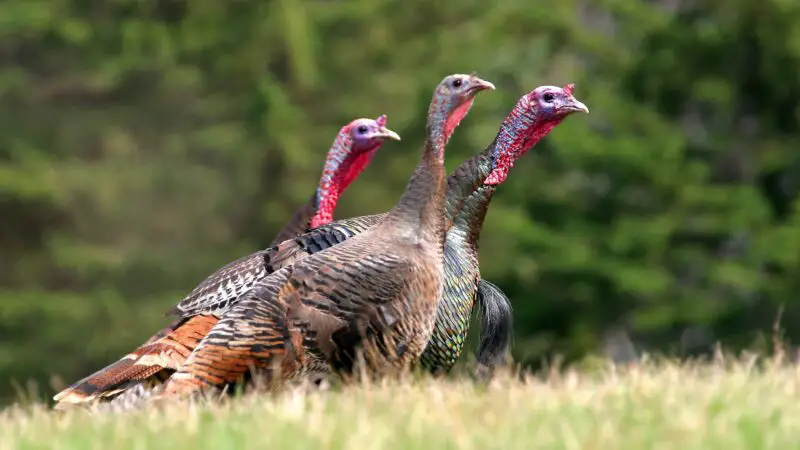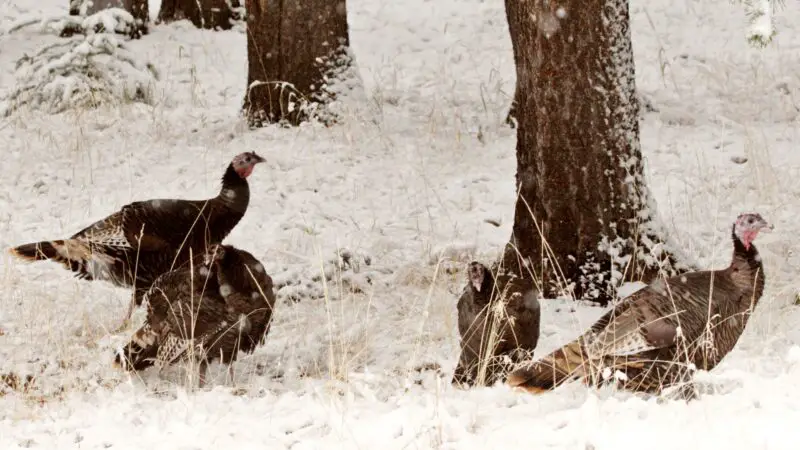Turkeys are some of the most fascinating birds out there. Aside from being bred for their meat, turkeys are an intelligent breed, which is why they are also favored as pets.
Turkeys are also hardy, so they do not need a lot of special care or attention. But with that in mind, how hard can they be? Are they resistant to freezing temperatures?
Because of turkey’s thick plumage, they can stay warm despite the freezing winter days. They can forage as usual as long as the snow is not thick enough to cover the vegetation.
To keep themselves warm throughout the night, wild turkeys will roost on trees, while domesticated turkeys will stay warm in an insulated coop.
If you want to know more about how turkeys survive the cold winter season, then you came to the right place. This article will teach you how they manage to do so, where they stay to keep warm, and what activities they do throughout winter.
What Happens to Turkeys in the Winter?

Turkeys are large birds native to South America but also have quite a large population in North America. As such, they are familiar with the different seasons that nature has to offer. Fortunately, they are born with thick and densely-packed feathers that keep them warm throughout the winter.
Because of their plump bodies, turkeys are incapable of long-range flying. That means that they are not capable of migrating to warmer places once the temperatures drop.
So during the winter, they go about with their daily life, only to be disturbed in case of a heavy downpour or a snowstorm.
The domesticated turkeys, on the other hand, are quite lucky. Most turkey farms have coops or barns that have excellent thermal insulation. This keeps the turkeys warm despite the sub-zero temperatures outside. They are also provided by the farmers with food and water, so they rarely need to leave their shelter.
Are Turkeys Active in Cold Weather?
Turkeys are quite active during the winter. Thanks to their hardy bodies and dense feathers, turkeys stay warm throughout the cold of winter. This allows them to continue with their activities despite the freezing conditions.
However, due to the limitations brought about by snow or rain, turkeys may spend most of their time roosting. They might only go down and forage when it’s safe below.
As for all other activities like courtship and breeding, turkeys usually do so during the warmer months of March to June.
Where Do Turkeys Live During Winter?

Where turkeys stay during the winter depends on whether they’re wild turkeys or domesticated turkeys.
In the case of wild turkeys, they would stay near a cluster of high-canopy trees to keep them safe and warm during the winter. Turkeys are capable of limited flight, and that allows them to perch on a branch where they plan to roost.
They can roost for long periods during the winter and even last for up to two weeks without eating. This is a survival skill they use when the situation on the ground is not ideal for foraging.
In contrast, domesticated turkeys usually stay inside thermally insulated coops or barns. This helps them stay warm throughout winter.
What Do Turkeys Eat in the Winter?
Since turkeys do not migrate during the winter, they continue to forage within their territory during winter. They will eat whatever food is available, including fruits, seeds, grains, worms, insects, and nuts.
They also feed on grass and other vegetation, as long as they are not yet buried too deep in the snow. However, their sharp claws can help them dig through a thin layer of snow and soil if they have to search for food.
How Do Turkeys Live in the Winter?
In the winter, turkeys will continue to live their life the way they usually do. However, they may not be as active as they are during the late spring to summer months.
In general, turkeys will continue to forage whenever the weather conditions permit it. They are cold-hardy enough to walk and dig through snow-covered areas. However, once the weather conditions become too harsh for them to forage, they don’t mind staying on their roost and staying warm for days.
Where Do Wild Turkeys Sleep?

Wild turkeys sleep while perched on roosts on trees. This way, they do not get buried under the snow, so they manage to stay warm.
Additionally, this also keeps them safe from ground predators that usually attack at night. This is a testament to how impressive wild turkeys are, especially considering how they manage to survive throughout the freezing winter days.
What Do Wild Turkeys Eat in the Winter?
Wild turkeys are omnivores, which means that they can eat a variety of food items. During the winter, they would search for food when the sun was out and eat whatever is available to them.
This includes fruits, seeds, nuts, grains, or whatever remains after the autumn season. They also prey on small insects, worms, and rodents if they ever come across one during their forage.
Do Wild Turkeys Migrate in the Winter?

Turkeys do not migrate during winter. Turkeys, even the wild ones, are not considered migratory birds. While they are capable of flight, their flying capacity is quite limited – it only allows them to reach branches on trees so they can roost.
In general, wild turkeys usually stay within their territory throughout the winter. At most, they can wander the area up to a radius of three miles in search of food. They do not travel far enough to consider it a migration.
How to Encourage Turkeys to Stick Around During Winter?
Due to the environmental challenges involved with the winter season, food is often scarce for the foraging wild turkey. Because of this, they often wander off alone in search of something to eat.
However, turkeys have a higher chance of survival during the winter if they are together. That’s why they should stick together during this cold period.
If you have a vast farm and would like your turkeys to stick together during the winter, here are some ways for you to consider:
- Build a barn for your turkeys. Perhaps the best way to keep all your turkeys huddled together during the winter is to build them a barn to shelter them. These barns can have roosts where they can sleep comfortably throughout the cold winter nights.
- Plant fruit-bearing trees or nut trees in a single area. During the winter, turkeys will still want to forage. To make it easier for them, you may want to plant fruit or nut trees in a single area on your farm. This way, all of your turkeys won’t wander far from each other as they search for food.
- Plant trees and shrubs together in a single area. If you do not have a barn on your farm, another option is to plant trees and shrubs next to each other. Aside from providing them access to food, these trees will also provide them with the shade and roosting spots necessary to keep them warm throughout the winter.
However, bear in mind that it is not advised to deliberately feed wild turkeys. The tips provided above will work best for domesticated turkeys only.
What to Feed Turkeys in the Winter?
As earlier discussed, turkeys are still capable of foraging through the winter, as long as the snow is not thick enough to completely bury the vegetation below. However, because there may not be a lot of pests they can prey on, the food available may not be enough for them.
As a result, it is best to supplement what they eat with seeds and grains like kernel corn, sunflower seeds, acorn, wheat, and oats. To make sure that your turkeys are getting enough food, a rule to follow is half a cup for every turkey per day.
Frequently Asked Questions
Where Do Turkeys Sleep at Night?
Wild turkeys prefer to sleep on roosts, preferably on large trees. This keeps them safe from predators.
In contrast, domesticated turkeys may opt to sleep inside coops or barns, although some owners will make them artificial roosts where they can sleep comfortably on.
Related: Best Housing for Turkeys | What Type of Housing Do Turkeys Need?
How Long Do Turkeys Live?
On average, domesticated turkeys, or those kept as pets, can live for up to ten years. However, wild turkeys may only survive between three to five years, especially given the living conditions they have to live through.
What Do Turkeys Do When It’s Cold?
During the seasons with cooler climates, domesticated turkeys will prefer to stay inside their coop to preserve their body heat. During this time, it is best to provide them with food inside the coop to keep them from leaving the coop.
Similarly, wild turkeys will prefer to stay on their roosting site, especially during severe snowstorms. They will usually peck and forage for food once the snow has thawed. Fortunately, wild turkeys can survive for up to two weeks without eating.
What Temperatures Can Turkeys Withstand?
Turkeys are most comfortable in places where the temperature is between 40 to 75°F. However, they can tolerate areas with freezing temperatures between 0 to 20° F for up to two weeks as long as they have food available. This is all thanks to their thick and dense plumage.
Unlike polar bears, turkeys are not exactly meant to live in the freezing arctic. However, turkeys do have thick layers of feathers that keep them warm whenever the temperature drops below the ideal.
Whether they’re wild or domesticated turkeys, these majestic birds can survive the winter as long as they find a warm roosting spot and have enough food to eat. And that also reflects how smart they truly are.
